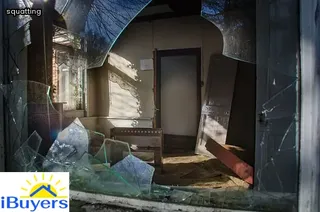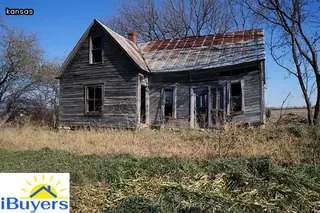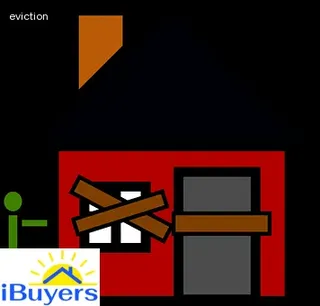Squatting has become an increasingly popular way to secure housing in recent years, and discovering one's rights in Kansas is no exception. The laws surrounding squatting can be complex, but understanding the basics of the law is crucial for anyone looking to secure a residence in Kansas.
Squatters, or those who occupy property without permission from the owner, have certain rights under state law, including protection from eviction by the property owner and legal remedies against any action taken by that owner. Additionally, squatters may be able to obtain title to the property after a period of time if their occupancy meets certain conditions.
Before attempting to squat on someone else's land, it is important to understand and comply with all applicable laws related to the process. It is also important for potential squatters to familiarize themselves with local zoning ordinances and building codes as they relate to squatting.
Knowing and understanding these laws can help ensure that whoever decides to take advantage of these rights does so safely and legally.

In Kansas, Squatter's Rights, or adverse possession laws, give people who occupy land and meet certain legal requirements the right to obtain title to the land they are occupying. In order to gain rights as a squatter in Kansas, one must demonstrate that they have been living on the property for at least 15 years, and that they have been paying all applicable taxes during that time.
Additionally, it must be demonstrated that the squatter has made substantial improvements to the property such as building structures, making repairs, or planting crops. The squatter must also be able to prove that their occupancy is open and notorious which means it is visible to anyone who visits the property.
Once these requirements are met, a court can grant ownership of the property to the squatters. It is important to note however that squatters are not entitled to any compensation from previous owners of the property prior to them acquiring title.
In Kansas, a resident may lay claim to a property through a process known as adverse possession. Also referred to as squatter's rights, the purpose of this legal doctrine is to allow individuals the opportunity to secure housing if they have established certain criteria.
To qualify for adverse possession in Kansas, an individual must prove that they have had continuous and exclusive control over the property for at least 15 years. The individual must also demonstrate that such occupancy was with the intention of excluding all others from claiming ownership and that it is being done openly, notoriously and without permission.
If these conditions are met and all applicable taxes have been paid during the time of occupancy, then an individual can potentially acquire title to the property through adverse possession in Kansas. In addition, any improvements made to the property during this period can be included in any transfer of title.

In Kansas, squatters’ rights are a reality that property owners must take into account when protecting their investment. It is important to understand the laws regarding squatters and how to protect your property from unauthorized people living on it.
The first step is to post “No Trespassing” signs prominently around the property or entryways, while also locking any gates or fences. Keeping an eye out for suspicious activity and unfamiliar people staying in or near the building can also be helpful in preventing squatting.
If someone does appear to be living on your property without permission, it is important to take legal action as soon as possible. Typically, this involves filing a court complaint alleging unlawful detainer against the squatter and obtaining a formal court order for them to leave the premises.
Additionally, it may be wise to consult with an experienced real estate lawyer about the best way to protect your rights and interests before taking further steps.
Evicting a squatter in Kansas is not an easy task, but it can be done with due diligence and adherence to the law. Knowing the rights of a squatter and the laws surrounding eviction are important in ensuring that all parties have their rights respected.
To begin, it's important to understand what constitutes a squatter in Kansas. A squatter is someone who has taken up residence in a dwelling without permission from the owner or without paying rent.
Once the presence of a squatter is known, there are several steps that must be taken to evict them legally. The next step is to serve the squatter with an eviction notice that clearly outlines their violation of your property and their obligation to vacate the premises within a certain period of time.
After this notice is served, you will need to file a complaint with your local court system and request an order for eviction. Finally, if the squatter refuses to leave, you may need to hire a sheriff or other law enforcement official to physically remove them from your property.
While evicting a squatter can be complicated, following these steps will ensure your rights as well as those of the squatter are protected throughout this process.

Squatting laws in Kansas are complicated and can be confusing to the average person. It is important to understand the basics of squatting in Kansas before attempting to secure housing.
According to the law, squatting is generally defined as occupying an abandoned or unoccupied property without permission from the legal owner. In some cases, a squatter may gain rights of possession if they have lived on the property for a period of time uninterrupted and without interruption.
However, it is important to note that squatting laws vary by state and that Kansas has specific rules when it comes to securing possession of a property through squatting. Squatters must also be aware that any improvements made to a property do not automatically give them rights of possession, and they may still be removed from the premises by law enforcement if necessary.
There are also certain circumstances where squatters may be able to claim legal ownership over a property, such as if they can prove that they were given permission by the rightful owner or if they have paid past-due taxes or utility bills associated with the home in question. Understanding these facts about squatting laws in Kansas is essential for anyone considering this option for secure housing.
In Kansas, establishing Color of Title (COT) is a crucial step in securing your rights to a property as a squatter. The COT process begins by obtaining proof that you have been in possession of the property for at least five years before filing your claim.
This evidence can be provided through documents such as bills, receipts, or utility records. After collecting all necessary documents, you must file a petition with the local court and provide an affidavit that attests to your occupancy of the land.
If approved, the court will issue an order granting you the right to possess the property and declare it yours. Once COT is established, it is important to continue paying taxes on your property so that you can maintain ownership of it.
Additionally, if any disputes arise about your claim to the land, having COT may help protect your rights as a squatter in Kansas.

Navigating the adverse possession regulations in Kansas can be a daunting task, but it doesn’t have to be. Knowing your rights as a squatter is an important part of securing housing in Kansas, and learning about the process of adverse possession is the first step.
The adverse possession law in Kansas states that property not being used by an owner for more than 10 years can become owned by another person if certain conditions are met. In order to successfully claim ownership of a property under this law, a squatter must occupy and use the property openly and continuously for at least 10 years, pay taxes on the property during this time period, maintain it as if they are the rightful owner, and demonstrate that they have made improvements upon it.
Once these criteria have been fulfilled, the squatter may submit their claim to a court to receive official title to the property. Although navigating these regulations may seem intimidating at first glance, understanding them can give squatters peace of mind when finding secure housing in Kansas.
In Kansas, there are two distinct categories of people who may be found living on someone else's property without permission: squatters and trespassers. Squatters are people who move into a vacant building or land with the intention of making it their home, while trespassers are those who enter and remain on another person's property without authorization.
Depending on the circumstances, either one can be liable for damages caused by their presence. Squatters have certain rights under Kansas law, so it is important to understand the difference between these two types of people and how they can affect your rights as a homeowner.
While squatters may have claim to some legal protection, trespassers generally do not have any rights in Kansas and can be removed from the property if requested by the owner. Additionally, squatters may even receive title to property if they meet certain criteria such as being in continuous occupation of the residence for a period of time that is specified by state law.
Knowing how to recognize these different types of individuals is key to understanding how you can protect yourself against potential problems down the road.

In order to file an adverse possession claim in Kansas, there are certain statutory requirements that must be met. The individual filing the claim must have had continuous and exclusive possession of the property for 15 years or more.
This means that the individual claiming ownership must have used the property openly and exclusively as if it were their own. Additionally, they should not have paid rent to anyone else and it should be visibly established that they have been using the property as their own.
Furthermore, they must not have entered into any agreement with the previous owner or tenant that would restrict their rights to possess the property. Lastly, the claimant needs to provide proof of payment of taxes on the subject property during those 15 years or more in order to demonstrate their exclusive use and occupancy of it.
In Kansas, it is important to prevent unauthorized occupants from taking up residence on your property. Squatters rights grant certain privileges to those who have been in occupancy of a property for a specified amount of time, even if they have no legal or financial ties to the property.
In order to avoid such situations, it is important for Kansas landowners to understand the laws regarding squatters and how to prevent them from claiming ownership of their property. Landowners can take steps such as informing all potential tenants that they must enter into a written agreement before occupying the premises, and ensuring that all leases are valid and up-to-date.
Notifying local law enforcement of any suspected unauthorized occupants can also help protect against squatters’ rights claims. Finally, making sure that any necessary paperwork is filed correctly with the county in order to properly document ownership is essential in preventing any squatter rights being granted by courts in Kansas.

If you are a homeowner in Kansas and find yourself with an unwanted squatter on your property, there are ways to remove the individual without taking legal action. First and foremost, it’s important to understand that squatters have certain rights that must be respected; however, these rights do not grant them unrestricted access to your property.
The best strategy for removal is to approach the situation diplomatically by speaking directly with the squatter. It may be possible for the two of you to come to a mutually agreed-upon solution without involving any third parties or the court system.
If you feel uncomfortable communicating directly with the squatter, enlisting help from a mediator or lawyer can help ensure that all parties involved abide by state laws. Additionally, if you don’t want to get too involved in negotiations, consider reaching out to local organizations such as homeless shelters or non-profit housing agencies who are qualified to handle these types of situations.
Taking this step could open up paths for relocation services and other resources for the squatter. Lastly, another option available is to post signage around your property informing potential squatters that trespassing is prohibited and will result in legal action being taken against them if necessary.
This may be enough of a deterrent for individuals who are considering unlawfully occupying your property.
Squatting is a practice of occupying an abandoned or otherwise unoccupied space without the permission of the owner. Although squatting is illegal in Kansas, the state does recognize certain rights for those who have been living in a property for a long period of time.
This article will compare Kansas’ squatter laws to those of nearby states to help guide readers on how to secure housing through squatting or adverse possession. In Nebraska, squatters can acquire title as soon as possession has been taken and maintained for 10 years.
Iowa requires 15 years of continuous possession before title can be passed onto the squatter, but this period is reduced to 5 years if there has been payment of taxes on the property during that entire period. Missouri also requires 15 years of continuous possession, with no taxes paid during that time.
Colorado requires 18 years of continuous possession in order to acquire title via adverse possession, while Oklahoma requires 20 years with no taxes paid during that period. As these laws vary from state to state, it’s important for potential squatters in Kansas to understand their rights and obligations when trying to secure housing through these means.

When it comes to dealing with squatters in Kansas, it's important to understand when self-help measures can be taken and when the law is necessary. In general, self-help measures are allowed when there is no landlord-tenant relationship.
If a squatter has been on the property for more than 15 days without permission from the owner, they may be treated as a trespasser, which means that you can use reasonable force to remove them or have them arrested. However, if the squatter has been on the property for less than 15 days, they cannot be removed by self-help measures; instead, they must be evicted according to Kansas Landlord Tenant laws.
If squatters are served with an eviction notice but still refuse to leave, a court order may be required in order to legally remove them from the premises. It's important to note that no matter how long a squatter has been living on your property, it is illegal for you to turn off their utilities or lock them out of their living space without first going through the proper legal channels.
When dealing with a squatter on your land, it is important to understand the potential legal liability associated with the situation. Squatting is illegal in Kansas, so it's important to know your rights and work with the squatter to find a solution that works for both of you.
Before attempting to evict a squatter from your property, consult an attorney who specializes in real estate and tenant law. Understand all relevant state laws regarding eviction procedures and any applicable squatters' rights.
It is also important to consider the financial implications of the situation before deciding how to proceed. If necessary, seek out legal advice on how best to handle the situation and protect yourself from potential liability.
Be sure to document all communication between yourself and the squatter as well as any agreements made between you. Finally, remember that evicting a squatter can be an emotionally difficult process and try to remain as objective as possible when making decisions about how best to proceed.

When it comes to discovering and enforcing squatter's rights in Kansas, local authorities play an important role. In situations where a private property owner wants to remove a squatter from their home, they must first contact the local authorities who will then assess the situation.
They are responsible for determining whether or not the tenant has legal standing within the state's laws and if they are eligible for eviction. Local authorities must work with both parties to ensure that all parties involved follow the appropriate procedures when it comes to removing a squatter from private property.
Depending on the individual situation, this can include anything from providing notice of eviction and legal assistance to helping coordinate relocation services. Ultimately, local authorities act as an impartial mediator between the tenant and property owner when resolving any disputes over squatters rights in Kansas.
The time period that must elapse before a squatter in Kansas can claim adverse possession of property varies depending on the type of land and the number of years it has been occupied. Generally, an adverse possession claim is established after 10 years have passed, but this time frame can be shortened or lengthened depending on whether the land is agricultural, residential, or wild.
For example, the time period for adverse possession claims on agricultural land is just 5 years. If a person has been using the land for more than 5 years for grazing animals, planting crops, and other agricultural activities, they are more likely to establish an adverse possession claim than someone who has lived on residential or wild land for 10 years.
When filing a claim for adverse possession in Kansas, it's important to know how long the squatter has been living on the property and what type of land it is because these factors will impact their chances of success.

The consequences of obtaining title through adverse possession in Kansas vary depending on the circumstances. It is important for those looking to secure housing in this manner to be aware of the potential pitfalls and risks associated with such a decision.
In general, squatters are subject to civil or criminal prosecution if they do not have permission from the landowner to inhabit their property. Furthermore, there may be additional fines or penalties levied against those who attempt to gain title through adverse possession without proper consent.
Additionally, it is important to note that in some cases, even if a squatter has met all legal requirements and successfully obtained title, they may still face eviction from the landowner if they fail to pay rent or taxes on the property. As such, it is essential for squatters in Kansas to understand both the legal requirements and potential consequences of obtaining title through adverse possession before moving forward with this route of securing housing.
When navigating the process of discovering squatters rights in Kansas, it is important to safeguard yourself against potential counterclaims by displaced tenants or owners. When seeking out a property, research the legal background to ensure there are no liens or other claims against it that could be used to challenge your right to occupy the space.
In addition, take steps to protect your investment by obtaining a title search and providing written notice of your interest in the property. Make sure you are aware of any local laws and regulations that may affect your claim.
Additionally, think about hiring an attorney if you have any questions or concerns about the legality of your situation. Lastly, if possible try to negotiate with the previous tenant or owner to come up with mutually agreeable terms for occupying their space so that you can avoid costly legal battles or eviction proceedings down the road.

In the state of Kansas, there have been several court cases in recent years involving legal disputes over the rights of squatters. These cases have addressed a variety of issues related to squatting, including whether a squatter has the right to occupy a property and remain there until they are evicted by a court order, or if they must vacate the premises immediately without warning.
In some cases, authorities have questioned whether squatters can claim ownership of property after living on it for an extended period of time. Other court rulings have determined that while certain laws may protect squatters from eviction, they do not grant them any form of ownership or entitlement to the property itself.
The outcome of these court proceedings has set forth important precedents for those seeking to understand their rights as a squatter in Kansas and how best to secure housing in such situations.
If you have discovered a squatter living on your property in Kansas, it is important to understand the rights of both parties in the eviction process. Under Kansas law, a landowner must provide written notice to the squatter informing them that they are no longer authorized to occupy the premises and must vacate within 30 days.
If this notice is ignored, the next step is to file an Unlawful Detainer action with the district court where the property is located. The court will then issue an Order of Eviction which requires a sheriff or constable to remove any persons occupying the premises.
In some cases, a landowner may need to seek legal counsel if further action is necessary or if there are extenuating circumstances such as squatters who are elderly or disabled. It's important for anyone considering evicting a squatter in Kansas to be aware of their rights and obligations under state law so that they can take appropriate steps towards securing their housing.

In Kansas, the duration of squatters rights can vary from case to case. Generally speaking, squatting in Kansas is viewed as a form of adverse possession and is only possible for a certain amount of time.
To establish a valid claim to squatters rights, the squatter must have continuously occupied the property in question for at least 10 years without any type of interruption or break in occupancy. After this period, it may be possible to gain legal title over the property by filing a petition with the court along with proof that you meet all other requirements.
It is important to note that there are numerous other requirements that must be met before obtaining ownership through squatting, such as providing notice to the property owner and paying taxes on the land. Furthermore, even if all these conditions have been met successfully, courts will not grant ownership if they find that it would cause an injustice or undue hardship on the rightful owner.
Ultimately, while it is possible to obtain title through squatting in Kansas, doing so requires a thorough understanding of both state and local laws and regulations surrounding this practice.
In the state of Kansas, Adverse Possession is a legal concept that enables an individual to gain title to a piece of real estate by meeting certain statutory requirements. In order to acquire property through adverse possession in Kansas, the person must possess the land for at least 15 years and meet other criteria established by law.
The individual must also demonstrate exclusive, open, notorious and continuous possession of the land for the full 15-year period while paying all applicable taxes. Furthermore, they must intend to maintain exclusive control over the property as if they were its rightful owner.
If all these conditions are satisfied, then title to the land may be acquired through adverse possession in Kansas. This process can provide individuals with secure housing who may otherwise not have access to it due to financial or other circumstances.
Squatting is a way of obtaining housing without having to pay rent or mortgage payments. In Kansas, if you are able to meet the requirements for squatters rights, you may be able to secure housing in as little as 7 days.
To acquire squatters rights in Kansas, an individual must occupy an abandoned property continuously and openly for seven days without permission from the owner. During this time period, the squatter must have exclusive control of the property and not share it with anyone else.
The squatter must also make a reasonable effort to maintain and protect the property from further damage and deterioration during that time period. Once these requirements have been met, Kansas state law provides that a squatter has established legal possession of the property, meaning they can stay on the premises and cannot be removed by anyone other than law enforcement officers without a court order.
Acquiring squatters rights can be a great way to secure housing quickly in certain cases; however, individuals should always ensure that they understand all legal implications before attempting this process.
A: Land owners in Kansas have the right to terminate a tenant at will tenancy at any time by providing the tenant with a Notice to Quit.
A: If a squatter does not voluntarily vacate the property, a land owner can file a Forcible Detainer action in court. The court will then hold a hearing where both sides can present evidence and arguments. If the court finds that the squatter has no legal right to be on the premises, it will issue a writ authorizing law enforcement to forcibly evict the squatter.
A: In Kansas, the statutes governing Faith-Based Property Management and squatters rights are outlined in Chapter 58 of the Kansas Statutes Annotated. These statutes provide guidance to property owners on their right to evict tenants at will who are not paying rent or property taxes. They also outline procedures for landlords to follow when dealing with squatters on their property.
A: In Kansas, squatters do not have any legal right to remain on the land if they have no legal agreement with the property owner. However, a squatter may be able to establish his/her rights in court if they can prove that they have made substantial improvements to the property or that they have been living there openly and continuously for a period of time.